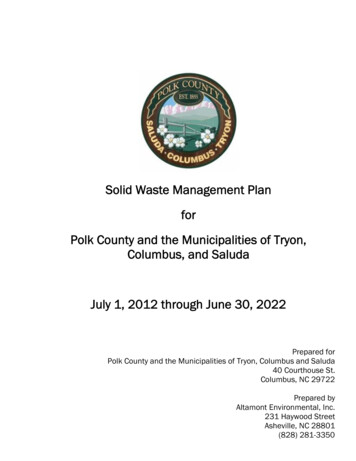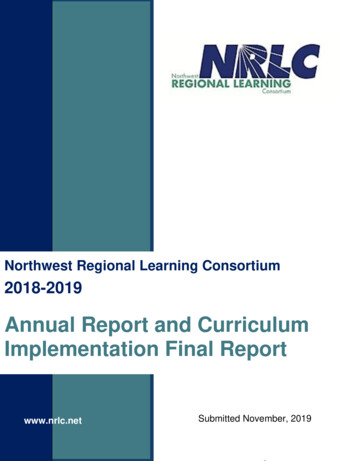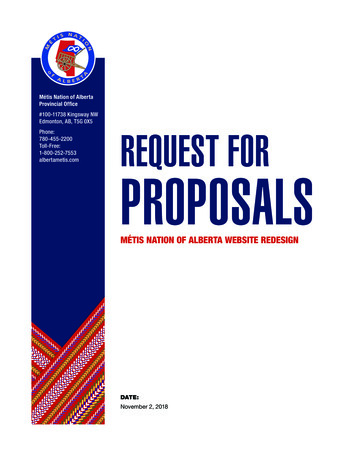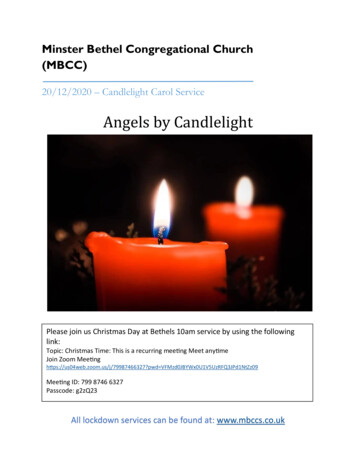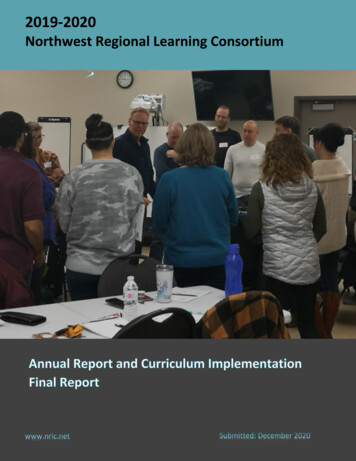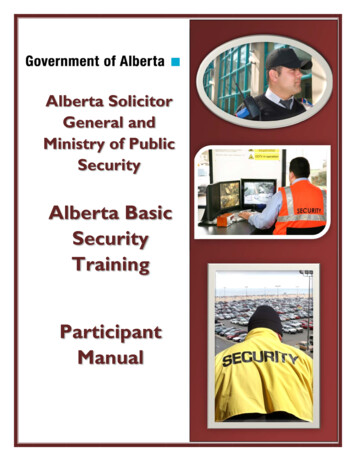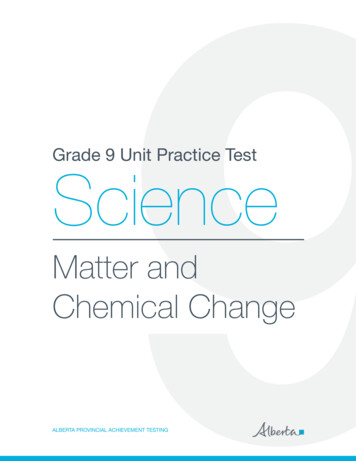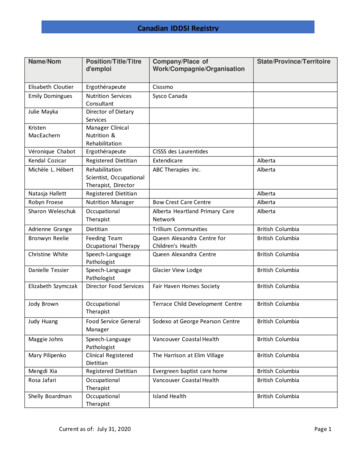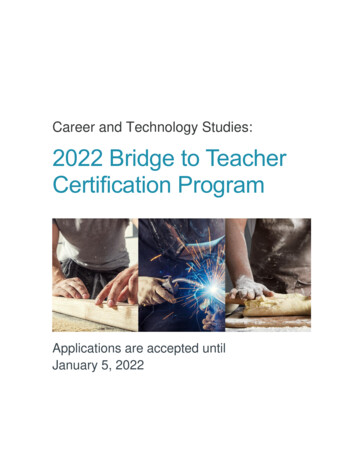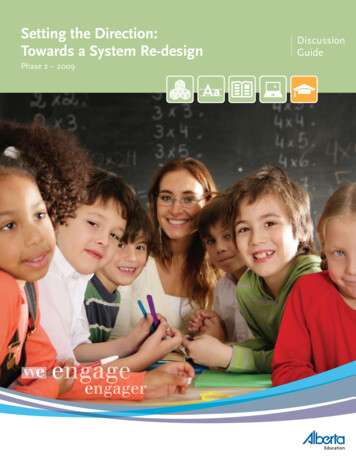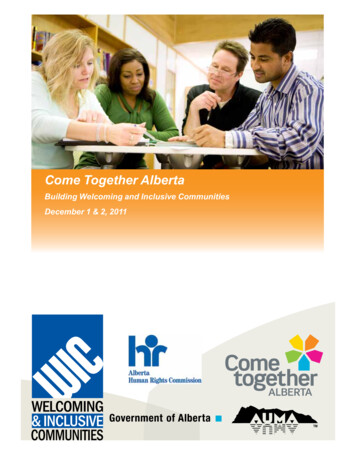
Transcription
Come Together AlbertaBuilding Welcoming and Inclusive CommunitiesDecember 1 & 2, 20111
Come Together Alberta Conference ReportContentsBackground3Event Objectives & Philosophy4Delegates5Agenda6Conference Sessions11Roundtable Discussions11Next Steps14Event Feedback152
BackgroundAUMA Welcoming & Inclusive CommunitiesThe AUMA Welcoming and Inclusive Communities (WIC) initiative is a partnership between the AUMA, theAlberta Human Rights Commission and the Government of Alberta. The goal of the initiative is to buildmunicipal capacity to combat racism and other forms of discrimination in Alberta communities.At the Second Annual Pan-Canadian meeting of the Canadian Coalition of Municipalities Against Racismand Discrimination in Calgary in March 2009, Alberta’s Provincial Network of Welcoming and InclusiveCommunities was formed.The objectives of the Provincial Network are: “I was stretched!”To provide networking opportunities among participating municipalities.To provide an opportunity for the sharing of best practices and resources.To provide support to municipalities as they work to become more welcoming and inclusive.To broaden the reach of welcoming and inclusive initiatives throughout the province.To increase the number of Alberta municipalities actively engaged in becoming more welcoming andinclusive.In September of 2009, Alberta’s Provincial Network of Welcoming and Inclusive Communities held its firsttwo-day meeting in Edmonton. Twelve municipalities were represented at the event. The objectives of themeeting included: To formalize the organization of a provincial network of welcoming and inclusive communities.To provide an opportunity for networking among participants.To provide an opportunity for the sharing of best practices and resources among participants.To provide learning opportunities on topics of relevance to participants.During this meeting, municipalities had the opportunity to learn from each other’s successes andchallenges. Participants also identified future directions for AUMA’s WIC initiative. This included thedevelopment of a WIC microsite and a diversity and inclusion campaign to be implemented in municipalitiesthroughout the province.“I find myself sharing the information with colleagues and being very inspired.”Come Together AlbertaIn the two years since the last Provincial meeting, the landscape of Alberta and Canada has changed,particularly in regards to the numbers of immigrants who have moved to the province looking for work anda place to raise their families. The greater visible presence of newcomers across the province has resultedin more attention being paid to the complex challenges faced by newcomers and the varied responses ofAlbertans to this visible diversity. In response to the growing needs expressed by Alberta municipalities forexpertise and learning in this area, and the desire of AUMA and WIC to continue to support the importantwork that municipalities are already doing, we felt the need for a second provincial meeting.The Come Together Alberta event was part of a larger initiative to pass on useful education and resourcesto municipalities. The WIC microsite (http://wic.auma.ca/) was first created in 2010 and has thus far3
proven to be a valuable resource for municipalities. The WIC Toolkit in particular, developed in 2006, hasbeen useful to municipalities looking to develop welcoming & inclusive strategies. With financial supportfrom Alberta Human Services Come Together Alberta funding stream, resources related to the attraction,retention and integration of newcomers—including a series of videos profiling best practices in four Albertamunicipalities—have now been added to the WIC microsite. In addition to the resources and the event,WIC is also offering a series of action planning workshops to help municipalities move their work withnewcomers forward.With the support of the Human Rights Education and Multiculturalism Fund, WIC contracted advertisingcompany FREE (formerly McRobbie Optamedia) to develop a Provincial Diversity and Inclusion Campaignthat aims to increase awareness about the value of diversity and promote local Welcoming and Inclusiveinitiatives. FREE has worked closely with municipalities in the development of this campaign. WIC officiallylaunched the new campaign material at the Come Together Alberta conference.Event Objectives & PhilosophyObjectives Share best practices in the area of immigration with municipalities and community members. Present new and cutting-edge knowledge, frameworks and practical tools to take home. Provide an opportunity for attendees to network for the purpose of sharing ideas, challenges andsuccesses. Launch AUMA’s Immigration Project microsite and the Alberta Welcoming and Inclusive CommunitiesProvincial Campaign.PhilosophyIn order for the event to have maximum benefit, we envisioned that it: Focus on knowledge sharing – from best practices to enduring challenges to new ideas Introduce attendees to cutting edge ideas and research in the field Balance theory and practical application Use interactive and participatory learning methods Emphasize relationship building and networking Inspire new and continued commitments to this important work4
DelegatesMunicipalitiesEnbridge PipelinesTown of BeaumontHolden Municipal LibraryTown of BonnyvilleCity of Brooks*City of Calgary*Town of CalmarCity of Edmonton*Town of EdsonTown of Elk PointTown of FalherCity of Grande Prairie*Village of HoldenTown of Lac La BicheCity of Lethbridge*Town of OldsCity of Red DeerTown of St. PaulTown of Smoky LakeHuman Resources & Skills Development CanadaKilkenny Community LeagueLethbridge Regional Police ServiceMontana First NationMulticultural Health Brokers Cooperative Ltd.NorQuest College Centre for Excellence inIntercultural EducationNorthern Lights Library SystemSt Paul Municipal LibraryStrathcona County FCSSStrathcona County LibraryUniversity of AlbertaVancouver Dialogues ProjectWetaskiwin & Hobbema MIYOYellowhead County Library BoardYellowhead Regional LibraryCity of Spruce GroveSpecial Guests fromStrathcona CountyAlberta Human ServicesTown of TofieldCity of Wetaskiwin*WildwoodRegional Municipality of Wood Buffalo*OrganizationsAlberta Agriculture and Rural DevelopmentAlberta Municipal Affairs, Library BranchAlberta Rural Physician Action PlanAlberta Culture and Community ServicesAlberta Human Rights CommissionLindisfarne ProductionsConference ConvenersAliya Jamal, Immigration Program Assistant,WIC, AUMAMarc Colbourne, Senior Project Coordinator,WIC, AUMACalmar Public LibraryCentral Alberta Refugee EffortCentre for Race and CultureEdmonton Public LibraryEdmonton Region Immigrant Employment CouncilEdson Public LibraryWe would like to acknowledge the contributions ofrepresentatives from Alberta Human Services, the AlbertaHuman Rights Commission, the Canadian Commissionfor UNESCO and our various municipal and communitypartners in the development of the conference concept anddetails.*Member of the Canadian Coalition of Municipalities Against Racism and Discrimination5
Agenda at a GlanceThursday, December 1Breakfast & RegistrationMeeting Welcome10:15am Setting the Stage: Newcomer Stories11:00am Roundtable #1: Why are we here?11:30am Break11:45am Assessing and Developing Intercultural Sensitivity in your Community12:45pm Lunch1:45pmIntroducing the Welcoming and Inclusive Communities Provincial Campaign & theCCMARD Toolkit2:15pmRoundtable #2: Where are we at?2:45pmBreak3:00pmCreating Welcoming Public 30pm8, 102, 5, 108, 103, 10EndCocktail ReceptionCome Together Alberta: Banquet & Launch of MicrositeFriday, December 2Breakfast & Registration9:00amThe Temporary Foreign Worker Program in Alberta10:00am Roundtable #3: What are our challenges? What are our successes?10:30am Break10:45am Relationship-Building with Aboriginal and Newcomer Communities12:00pm Lunch12:45pm Strategies for Creating an Inclusive Workplace2:45pmClosing Conference Remarks8:00am63, 8, 103, 5, 6*Each session will relate to one or more of the Coalition of Municipalities Against Racism and Discrimination’s tencommon commitments.6
Thursday, December 19:00am – 4:30pm9:00amBreakfast & Registration10:00am Meeting Welcome10:15amOpening Prayer: Myrtle CallahasinSetting the Stage: Newcomer StoriesListen to a panel of stories told by newcomers to Canada and learn what contributes to wellbeing and a sense ofbelonging in a community. Laying the foundation for this two day event, this session will emphasize the diversityof experiences within newcomer communities and get you thinking about how to build strategies that are trulyresponsive to the needs of newcomers.Dr Valerie Mason-John aka Queenie immigrated to Canada in 2008. She is the author of six books, including DetoxYour Heart – working with anger, fear and hatred, and Broken Voices – the lives of the most oppressed women inIndia – the Dalit. She is a consultant in conflict transformation, working with immigrants, refugees, asylum seekersand with Edmonton Public. She has just completed her 2nd novel – The War Done Done, family Saga during theSierra Leone Rebel War, and is currently co-editing an anthology on African Canadian Poetry. www.valeriemasonjohn.comMohamed Yusuf-Idriss As a global nomad, Mohammed lived in four different continents before moving to Canada.He is very involved in his community, sitting on different boards, taskforces, organizations and community initiatives locally, provincially and nationally. Mohammed’s education is as diverse as his many past postal codes. Heholds degrees in Language and Literature, General Management and Human Security and Peace Building. Mohammed’s career is also very diverse. He worked as Development Coach, Community Facilitator, Disaster management Instructor and management consultant. He is currently the Service Manager at Brooks and County Immigration Services. Mohammed’s passion is in promoting unity in diversity. Mohammed, his wife Biftu, and their babydaughter Noor call “Brooks, Alberta” home.11:00am Roundtable 1: Why are we here?Roundtables are designed to foster reflection, knowledge sharing and network building. Each participant will participate in a discussion group; at each of four roundtable sessions throughout Thursday and Friday, discussions willreconvene to continue building on conversations and insights.11:30am Break11:45am Assessing and Developing Intercultural Sensitivity in your CommunitySensitivity to cultural difference is one of the challenges faced by host community members seeking to be welcoming and inclusive. But how can you tell how sensitive people are? What difference does intercultural sensitivitymake toward achieving the goals of welcoming communities? In this session you will hear about the Developmental Model of Intercultural Sensitivity (DMIS) and a statistically reliable tool, the Intercultural Development Inventory(IDI), that can be used to measure it. The presenter will also share examples of practical ways intercultural communication competence is making a difference in communities and organizations that seek to be welcoming andinclusive. You will leave this interactive session with concrete ideas for your community.Sarah Apedaile is an intercultural specialist with the NorQuest Centre for Excellence in Intercultural Education. Shedoes applied research, curriculum development, training and instructs courses in intercultural communication.Sarah is qualified administrator of the Intercultural Development Inventory. Her publications include Critical Incidents for Intercultural Communication, Roots and Connections: A Culturally Integrated Curriculum for CommunityOrientation, the Intercultural Coach and Intersections 2: A Guide to Inclusive Non- Profit Governance in Alberta.12:45pm Lunch7
1:45pmGreetings from the Alberta Human Rights CommissionHonourable Blair Mason, Q.C., Chief Commissioner, Alberta Human Rights CommissionIntroducing the Welcoming and Inclusive Communities Provincial CampaignWith financial support from the Human Rights Education and Multiculturalism Fund, the WIC initiative has developed a provincial diversity and inclusion campaign strategy. McRobbie Optamedia will give an overview of the toolsthey have created and how the campaign can be effectively implemented in your community to raise awarenessabout diversity and inclusion initiatives.Presenters: Jamey Hawtin & Michael Brechtel, McRobbie OptamediaMcRobbie Optamedia is a full-service marketing communications agency with a 20 year history of inspirationalcreative and proven client service. Their team of 18 professionals has earned more than 50 awards and hasworked with a significant list of clients including government, industry and national brands. As a medium-sizedagency, they are able to provide personal client service, an experienced strategy and creative team combined witha history of successful marketing, communications and advertising projects.Presenting The Canadian Coalition of Municipalities Against Racism and Discrimination ToolkitThe newly developed CCMARD Toolkit provides municipalities with practical tools and information to use at allstages of their CCMARD membership; from considering membership in the Coalition, to developing an action plan,to evaluating the progress of their CCMARD initiatives. This session will provide a brief overview of the Toolkit.Presenter: Marc Colbourne2:15pm2:45pm3:00pmRoundtable 2: Where are we at?BreakCreating Welcoming Public SpacesBased on the idea that public spaces are the base layer that social engagement is built on, best practices andcutting edge thinking will be shared about how to create public spaces that are welcoming and inclusive of newcomers and other marginalized populations. This includes how we think about urban planning and infrastructure,where we put parks and outdoor public places, what we think buildings are for, how we design them and what wefill them with. Case studies from different communities will be featured.Dr. Rob Shields is Director of the City Region Studies Centre at the University of Alberta, the Henry Marshall ToryChair and a Professor in the Department of Sociology and the Department of Art and Design. Rob’s work spansarchitecture, planning and urban and regional geography. His interdisciplinary research is in the areas of culturalstudies, regional development and locative media. He founded CURB magazine and has lectured around the worldon various topics to do with urban planning, space and culture.Shafraaz Kaba is an architect working for Manasc Isaac in Edmonton for the last 11 years. Before that, he spenta year working on housing and development in northern Pakistan, an experience which he gained a deep appreciate for all the things we take for granted here: clean water, reliable power and central heating. He is originally fromTanzania but grew up in the suburbs of Edmonton, and has grown to love this city after learning to love winter.4:30pm6:00pm6:30pmLesley Winfield has been the Library Manager in Olds Alberta for nine years. She has also served a term on TownCouncil and functioned as the Chair of the Olds Welcoming and Inclusive Communities committee for severalyears. “Community work is about bringing people together and breaking down boundaries.”EndCocktail ReceptionCome Together Alberta Banquet & Microsite LaunchThis evening, AUMA is pleased to officially launch a set of best practice videos that profile what the municipalitiesof Wood Buffalo, Olds and Brooks are doing in attracting, retaining and integrating newcomers. These videos willbe the highlight of the newly redesigned WIC website, complementing a rich online library of resources for workingwith newcomers, as well as in three other WIC areas of focus.Take the new WIC website for a test drive, browse resources you can take home with you, make a pledge on theProvincial Campaign pledge board, all while enjoying music by a local artist and a delicious dinner.Mona Abdolrazaghi, Persian flamenco guitar player introduced to the world of music at the age of seven years. Theinspiration of the artist is mostly by Middle Eastern and Spanish music influenced by the great flamenco guitarplayers such as Paco Pena, Paco De Lucia and Vicente Amigo. In 2006, Mona received the honor of the FlamencoGuitar finalist with 10 other flamenco artists in Iran Flamenco Guitar Festival competing against 100 guitar participants. Mona has co-operated with her brother, Amir Mohsen, in composing the sound track for several short films,one of which was recently submitted to the Bournmouth student film Fest. Mona is planning to present her workinspired by a combination of different styles of world music such as Indie, folk, Jazz with profound modal Spanishmusic and performing on larger stages.8
Friday, December 28:00am – 4:30pm8:00amBreakfast & Registration9:00amThe Temporary Foreign Worker Program in AlbertaMartin Shields has been involved in municipal governance since 2004 – he served from 2004-2007 as a Councillor and from 2007-present as the Mayor. He holds a Bachelor of Arts, a Bachelor of Education and a Master ofArts and prior to his career in politics, Mayor Shields served as a teacher and school administrator for 25 yearsand a University part time instructor for 20 years. He currently serves as the Director of Strathmore-Brooks AlbertaConservative Constituency Association and is a past President of the Medicine Hat Federal Conservative Constituency Association. Mayor Shields has been living in Brooks with his family for 25 years and is very committed to thesuccess and quality of the community. This is evident through his involvement in various organizations such as theAlberta Library Trustees Association (Board Member), the Alberta Urban Municipalities Association, the ShortgrassRegional Library System Board (Vice Chair Person), Palliser Regional Health Board, and the Palliser Area HealthAdvisory Committee.Yessy Byl has worked as a labour lawyer in private practice and on staff with unions in Alberta. She was also theTemporary Foreign Worker Advocate with the Alberta Federation of Labour from 2007 to 2011. As the TFW Advocate, she co-authored two reports on TFWs: “TFWs – Alberta’s Disposable Workforce” ( November, 2007) and“Entrenching Exploitation” (April 2009). She currently works as the Northern Alberta Educator for the Alberta CivilLiberties Research Center, is a tutor for Athabasca University in labour studies and is also working temporarily forUnited Nurses of Alberta. She has been a volunteer lawyer for the past ten years with the Edmonton CommunityLegal Centre and is a past Board member and was instrumental in setting up the TFW program with ECLC. Sheworks with the ECLC TFW clinic as well as with a number of agencies providing services to TFWs in the Edmontonarea.10:00am10:30am10:45amPercy Cummins has worked for the Government of Alberta since 1980. He has worked in both rural and urbanservice delivery offices as well as several policy roles. Percy is currently the Executive Director of Immigration Policyand Programs within Alberta Human Services. His area is responsible for Federal/Provincial Immigration programissues, Foreign Qualification Recognition, settlement services, innovative language training projects and Alberta’spermanent and temporary immigration policy.Roundtable 3: What are our challenges? What are our successes?BreakRelationship-Building with Aboriginal and Newcomer CommunitiesAboriginal and newcomer communities are sometimes seen merely as target groups for service provision orintegration into mainstream society. But how can organizations support the wellness of these communities usinggenuine citizen engagement tools and responsive policy development? This session will talk about how to engagewith marginalized communities, and how to find points of intersection and potential dialogue between them. Thepanelists will provide both a conceptual overview and profiles of best practices within municipalities.Ashima Sumaru (BA, BEd) is the coordinator for the Migrant Routes program at the Centre for Race and Culture.She has delivered cultural competency, anti-racism and diversity and inclusion training to a wide variety of audiences. Her current research interests include sharing power in the classroom and linking current immigrationissues to global and historical contexts. Ashima is also very familiar with adult education, participatory educationand family literacy.Annie McKitrick is the Social Planner in Strathcona County. Prior to coming to Alberta, she worked for the City ofWilliams Lake as the Acting Manager of Social Development where she worked on the Official Community Planwhich includes a cultural diversity focus acknowledging the First Nations communities. For five years, she workedas the Manager of a community-university research partnership, the Canadian Social Economy Hub. Prior tomoving to Victoria she worked for over 20 years with immigrants and refugees and helped found the RichmondMulticultural Concerns Society and the BC Settlement and Integration Workers Association and was the Coordinator of the Vancouver Community College Certificate Program for settlement/multicultural workers. Annie was alsothe Executive Director of a Social Planning Council. Her interest in immigration and cultural diversity comes fromher background as a United Nation kid, and her own immigration to Canada from France.Karen Fong works for the City of Vancouver as the Project Coordinator for the Vancouver Dialogues Project, whichaims to foster greater understanding and strengthened relations between Aboriginal and immigrant communities.Prior to this position she completed a Master of Science in Planning from the University of Toronto, with a focus onthe integration of skilled immigrants in the labour market.12:00pm Lunch9
12:45pm Strategies for Creating an Inclusive WorkplaceThe Labour Program’s Racism-Free Workplace Strategy reflects the Government of Canada’s leadership rolein the fight against racism, and promotes a fair and inclusive workplace, free of discriminatory barriers to theemployment and advancement of members of visible minorities and Aboriginal peoples. It focuses primarily onworkplaces under the jurisdiction of the Employment Equity Act and the Federal Contractors Program. In thisinteractive workshop, municipalities will learn how to access the resources, networks and training offered byRFWS. The workshop will also include an interactive discussion on the topic of Strategies for creating a raciallyinclusive workplace, to share practical ways to recruit and interview members of visible minorities by engaging indiscussions with other human resource professionals, recruiters and hiring managers.2:45pmAnne-Marie Pham is the Racism Prevention Officer for the North West Pacific Region and supports employersacross Alberta to build racism-free workplaces. Anne-Marie is a seasoned diversity educator and has workedclosely with community and government stakeholders to create innovative regional and national partnerships tosupport the creation of new tools and resources for the Strategy. Anne-Marie holds a Master’s Degree in publicadministration and a BA in Sociology. In 2008, she was the runner-up for the Canadian Asian of the Year Award. In2005, she received the Alberta Centennial Medal for outstanding community leadership and volunteerism.Closing Conference Remarks10
Conference SessionsVideos of all conference sessions are available, along with accompanying presentations, e DiscussionsScheduled over the two days of the event, the three Roundtable Discussions gave participants a chance toreflect on what they had heard in the sessions, make links between new information and their own contexts,and connect with each other personally and professionally. The roundtables also enabled people to benefitfrom the abundance of expertise and insight in the room; sharing best practices and learnings has beenrepeatedly identified as a key desire of both municipalities and community members working on WICrelated initiatives.The aim was for each discussion to build on the previous one in order to advance conversations andknowledge; to that end, a summary of the previousdiscussion was read out before starting the next one.“Never give up, it might not be theThe following are thematic summaries of thediscussions.Roundtable 1 (Day 1)right time for the community toembrace the WelcomingCommunities right now, BUT, ITWILL COME.!”Question: What are the qualities of a Welcoming and Inclusive Community?On a personal level? Respect was a word that showed up repeatedly A great deal of emphasis on the responsibility of individuals to reach out to newcomers, to speak outagainst racism and to champion WICo Newcomers also have a responsibility to share their experiences Importance of education and understanding, whether it be learning about other cultures, or beingaware of one’s own personal bias Other words: caring, listening, participation, safe, comfortOn a municipality/organizational level? A WIC must have vision, leadership, and a policy/strategy/plan – and then they need to walk the talk Evolve Be aware of the system and the barriers it can create Education and training is key at the organizational level Need to be able to provide or coordinate a number of different services e.g. welcome wagon,language and other training, etc. Celebrate differences, recognize similarities Communicate & coordinate11
On a societal level? Break down misperceptions, we need to admit there is a problem Include WIC in schools Dialogue is key but where do you begin? Move from ‘Us and Them’ to just ‘Us’ Need a deeper understanding of how different cultures approach integration Participation of everyone is needed – it’s a two-way street Educate & celebrate Canadian identity needs to be transformedRoundtable 2 (Day 1)Question: Considering the presentation on intercultural sensitivity, where do you believe yourcommunity/organization is at? Where do you hope to go next? What might your community/organization do to get there? The vision is present but we need to move beyond implementation, beyond talk. Various communities are making large strides to be inclusive. How do we measure success? How do we acknowledge challenges? Awareness is key Services need to reflect demographics. What does a culturally competent service really look like? Take care not to be “over-sensitive”. Perceptions around Temporary Foreign Workers need to be addressed. How do we encourage longerrun integration? Focus should be first on interconnectedness, which leads to interdependence. Involve children – give them positive experiences. I came in thinking much had been done . now realizing there is a long road ahead. Has to become a priority for “people with power”. Realize mistakes and act to correct. Use toolkits to influence behaviour. Blanket solutions do not work. Lots of communities at minimization and polarization phase. Seek out information from other WIC communities – “lessons learned”. Challenges are also opportunities. Important not to get frustrated. Realize the process can be 2 steps forward, 1 step back. Sustainability includes social sustainability. Integrate into strategic plans. Don’t just fund the “next idea” – need to continue to support tools that already exist.12
Roundtable 3 (Day 2)What challenges have you faced in your community/organization? How have you overcome them? Working with business in the communityo Need to inform community of new arrivals/hires before and when they come Bureaucracyo Lack of harmonizationo Recent changes to TFW Program; process needs to be streamlinedo Too much red tape Not enough capacity to help newcomerso Social services“Our population is 350. We areo Housingo No settlement servicesvolunteered to death. Thesame 6 people do everythingin this community” Misconceptions about newcomerso How long TFWs can stayo Understanding various immigration streamso Getting hiring managers educatedo That immigration costs a community Organizations don’t reflect community diversity, but it is hard to engage newcomers in organizationslike volunteer groupsWhat successes have you had? TFWs are dedicated and loyal Making newcomers feel welcome by creating opportunities to do that Successful language training Need to acknowledge costs and challenges to communityWhat have you learned along the way? Resources availableo Manitoba modelo Municipal affairs language database (Mango Language Learning Software, free at all AB publiclibraries)o Public education videoso Churcheso Libraries Be flexible Get a community champion Communicate well with employers who are bringing people The ultimate good is the retention of newcomers13
Next StepsAUMA aims to continue to support Alberta municipalities to share information and connect around bestpractices and learnings regarding immigration and diversity. We encourage event participants to use thecontact list that was sent out post-conference to get in touch with others and find ways to continue theknowledge sharing, and perhaps even build collaborative relationships to support each other’s work. Wehope that this event played a small part in moving Alberta in the direction of a province that is welcomingand inclusive to all its current and potential residents.Here’s how AUMA can continue to support your municipality’s immigration work:Immigration WorkshopsAs a part of AUMA’s immigration project, we are offering free capacity building workshops to Albertamunicipalities to develop an immigration action plan. These workshops are a one-time offering and aim tosupport municipalities at whatever stage of planning for immigration they are at—just starting out or highlydeveloped. Contact Aliya Jamal if you are interested in hosting a workshop in your municipality.Provincial Div
Marc Colbourne, Senior Project Coordinator, WIC, AUMA We would like to acknowledge the contributions of representatives from Alberta Human Services, the Alberta Human Rights Commission, the Canadian Commission for UNESCO and our various municipal and community partners in the development of the conference concept and details.
